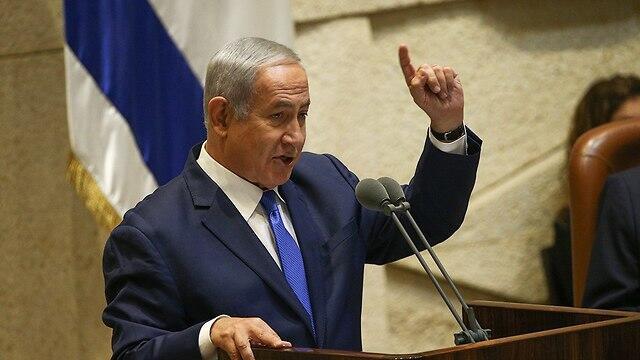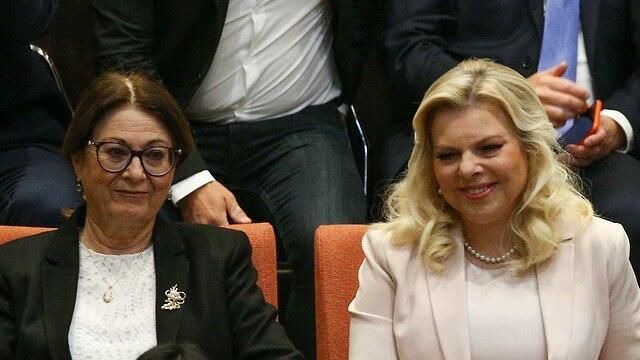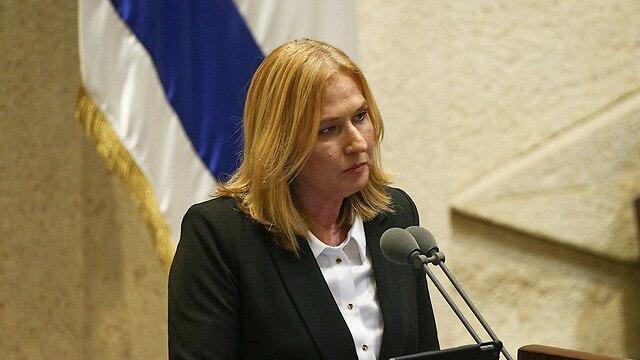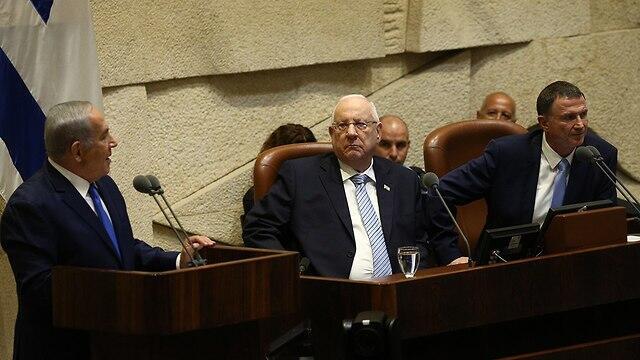Getting your Trinity Audio player ready...
Prime Minister Benjamin Netanyahu said Monday that Israel continues to act against the establishment of Iranian military in Syria, and emphasized that he stays in constant contact with Russian President Vladimir Putin.
and Twitter
The prime minister spoke at the kick off of the Knesset’s winter session amid the ongoing uncertainty over the new IDF draft law that might dismantle the coalition and trigger early elections. Opposition leader MK Tzipi Livni, President Reuven Rivlin and Knesset Speaker Yuli Adelstein were among those who also gave speeches at the onset of the session.
“Even today Israel is acting against Iran in Syria, and we will continue to try and push it back," Netanyahu exclaimed.
5 View gallery


Prime Minister Benjamin Netanyahu speaking at the start of Knesset's winter session
(צילום: אוהד צויגנברג)
Netanyahu also emphasized his close relationship with President Putin, in light of recent tensions caused by the downing of the Russian spy plane in Syria, which sparked an international crisis and prompted the Russians to supply Syrian army with S-300 anti-aircraft system.
"I maintain frequent and direct contact with President Putin … Our friendly relations and mutual appreciation is very important to me. It allows us to deal with complex and difficult challenges in our region. These relations are also important for the security of Israel," the Netanyahu stressed.
“However,” went on the prime minister, “the most important of all is the alliance we’ve established with our greatest friend—the United States.”
“Not only is the Trump administration committed to support us when it comes to security, the American president has also elevated the US support for Israel at the UN to a whole new level. We are in the eye of the storm, with the turbulent Middle East around us, but I will not let this storm shake us," the prime minister said as he thanked all national security bodies.
The Prime Minister also addressed the Palestinian issue and the volatile situation along the southern border.
"As a person who has fought in wars and lost friends and comrades who fell in battle, I know how bad and painful a war is. I am doing everything to prevent unnecessary wars but if we are required to act against our enemies, we won't hesitate,” he stressed
"I would like to emphasize that the obstacle to peace is not in our midst, it is among the Palestinians," he added.
Netanyahu also accused Palestinian President Mahmoud Abbas of indirectly supporting terrorism by providing payments to perpetrators and not condemning terror attacks on Israeli citizens.
“So far, I have not heard Abbas’s condemnation of the cruel and shocking murder of Kim Levengrond Yehezkel and Ziv Hagbi,” he bemoaned, adding “the Palestinian Authority continues to finance these vile murderers. Abbas, who demands a Palestinian nation-state free of Jews … rewards those who murder Jews.”
As for Israel's achievements over the past decade, which Netanyahu labeled “prosperous”, the prime minister said that "our foreign relations are unprecedented, hundreds of heads of state, ministers and senior members of parliament come to Israel every year."
"They admire our military and intelligence capabilities, they admire our economic and technological strength, we systematically nurture these strengths and they give us tremendous political power," Netanyahu opined.
"In spite of all this," the prime minister continued, referring to the opposition, "there is a small and disgruntled minority who brazenly makes outrageous statements like: 'They stole the state from us’ … our country is not stolen … This is the new Israel, where everyone has equal opportunity."
The 68 year old also called the notion, that the Israeli democracy is under attack following the passing of the contentious Nation-State Law, “absurd.”
"Israel is a vibrant and healthy democracy. The courts and individual rights are not and will never be in any danger," he vented, before attacking the media as well, saying the media itself “restricts the freedom of expression” by implying that Israel is “a fascist state.”
Toward the end of his speech, Netanyahu addressed the IDF draft law in light of the ultra-Orthodox coalition partners’ decision not to order its MKs to quit the government.
"We hope that we will pass it soon … we recognize the value of bible study and the unity of the nation," he concluded.
Opposition leader Tzipi Livni took the stand following Netanyahu's speech.
"I hope that this is the last Knesset session in which Benjamin Netanyahu speaks as a prime minister. It's not a personal issue, it's a national one,” she raged.
Livni also condemned what she views as Netanyahu’s disregard for those who did not vote for him, saying the prime minister wants for the public to show “loyalty” to him personally and not to the state.
"What disintegrates us from within is not the opposition's criticism of the government but the fact that the government has become an opposition to the democratic institutions, to the legal system, to the enforcement of the law and to the media," Livni asserted.
President Rivlin spoke before Netanyahu took the stage, conveying a positive message regarding the country’s future.
“In Israel of 2018 everyone wants to influence how the country looks. But I have a feeling that each side is pulling in its own direction and the flag may be torn. Peace, that we argue about, has become a weapon. Empathy is evaporating, our ears are closing, inner peace is lost. We are starting to think and talk about ‘package deals,’” Rivlin explained.
“I do not fit the accepted package deal,” said the president, “not of the right and not of the left. I am a humanist … I am a Zionist with every fiber of my being, and as such, I believe in civil rights and the rule of law. I believe in judicial conservatism and criticize judicial activism, and will continue to say proudly and clearly ‘there are judges in Jerusalem’. I believe in liberty and equality, and believe in our right to the land.
“Complexity is not a plague. Complexity is not a ‘lack of backbone’. It is also not a lack of a clear point of view. Complexity is humanity. Complex people do not only vote for the center. They vote for the right, and for the left,” the president underlined.





